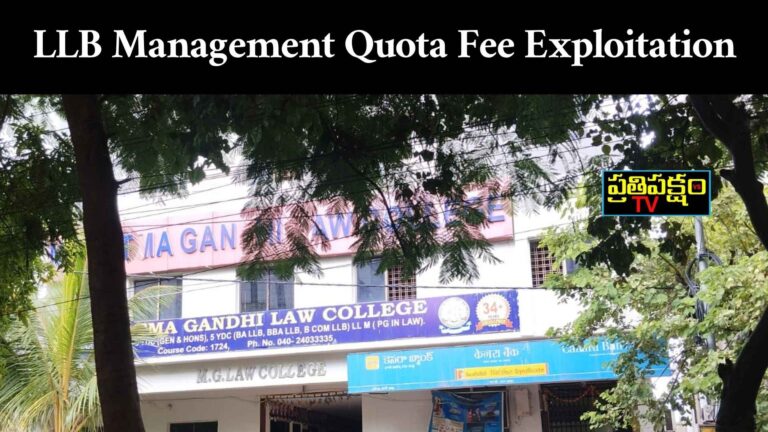Management Quota LLB Seat Exploitation in Telangana Law Colleges — PrathipakshamTV Special Report
When we think of the most respected professional courses in society, the first names that come to mind are Medicine, Engineering, and Law. These three fields have traditionally been seen as prestigious career paths. However, the trend is now changing. Even well-employed professionals, doctors, and engineers are showing interest in pursuing legal education.
With growing legal awareness among citizens and expanding opportunities in the legal field, the demand for LLB (LawCET) courses has been steadily increasing year after year.
LL.B Course Demand and Seat Limitations
In Telangana, two types of LLB courses are currently available:
Three-Year LL.B – for candidates who have completed a degree.
Five-Year Integrated LL.B – for students who have completed Intermediate (12th).
Every year, nearly 50,000 students apply for admission to these two courses combined. However, there are only about 7,000 seats available in government and private law colleges across the state.
With limited convener quota seats, thousands of students are forced to turn toward the management quota for admission.
LLB Management Quota Fees — Open Exploitation Before Students’ Eyes
PrathipakshamTV visited around eight law colleges in Hyderabad to investigate the ground reality of management quota admissions. The findings were shocking.
Colleges such as Keshav Memorial Law College, Ambedkar Law College, Pendekanti Law College, and KV Ranga Reddy Law College stated that no management quota seats were available.
Meanwhile, Ponuganti Madhava Rao Law College demanded ₹4 lakh for the five-year LL.B course, to be paid in two installments. Similarly, Mahatma Gandhi Law College demanded ₹4 lakh for the five-year course, insisting that the entire amount must be paid in a single installment.
Students were shocked and disappointed.
“It’s impossible for our parents to pay such a huge amount at once for a five-year course,” said several aspirants in despair.
Requests for Annual Payment Rejected
Some students pleaded with college managements, saying,
“We are ready to pay ₹4 lakh in total, but allow us to pay it year by year.”
However, the colleges flatly refused, insisting that the full fee must be paid upfront.
Management Quota or License for Loot?
Generally, management quota seats constitute around 25% of total seats in private law colleges. Since these seats are fully under the control of college managements, they freely decide their own fees.
While the convener quota (LawCET) fees range between ₹20,000 and ₹42,000 per year, the same seat in the management quota costs anywhere from ₹1 lakh to ₹3 lakh per year.
Students revealed another disturbing trend —
“Unless there’s a recommendation from a political leader or top official, management quota seats are not allotted,” said one student.
Such practices are reportedly common across Telangana’s law colleges, leaving many students disillusioned.
Students’ Disappointment — Are Their Dreams of Legal Education Dying?
Thousands of students who dream of becoming lawyers now find themselves discouraged and helpless. Some are deciding to prepare again for next year’s LawCET, while others are desperately trying to negotiate fees with college administrations.
One student told PrathipakshamTV:
“We didn’t get a government seat, so we tried management quota. But after hearing these exorbitant fees, we gave up. We come from middle-class families. If this continues, legal education will remain only for the rich.”
Colleges Defend Themselves — “Government Fee Is Too Low”
College managements, on the other hand, claim that the government’s prescribed fees are too low.
“The cost of teaching, infrastructure, and maintenance is much higher. That’s why management quota fees are slightly higher,” they argue.
But students and parents reject this justification.
“Even if fees are high, at least they should allow yearly installments,” they countered.
Government Intervention Needed
Students are now demanding government action:
“The government should increase the number of convener quota (LawCET) seats and impose a maximum limit on management quota fees.”
Currently, LL.B education in Telangana seems accessible only to the wealthy, which violates the principle of equal opportunity in education.
If the government truly wants to make legal education accessible to all, it must formulate a clear and strict policy regulating private law colleges.
Students’ Suggestions and PrathipakshamTV Analysis
A Regulatory Committee must be formed to monitor and cap management quota fees.
Government law college seats should be increased by at least 50%.
An online transparent admission system should be introduced to prevent seat selling.
Scholarships should be provided for students from economically weaker sections.
PrathipakshamTV’s analysis shows that education is becoming increasingly commercialized in Telangana.
Legal education, which is meant to promote justice and social awareness, is being transformed into a luxury commodity available only to those who can afford it.
Conclusion
Legal education is not merely a degree — it is a social responsibility that empowers individuals to deliver justice to society.
Turning such an education into a business venture is dangerous.
The exploitation in Telangana’s management quota law college admissions is crushing the dreams of thousands of aspiring lawyers.
Students have just one plea:
“Let the government intervene and protect our right to affordable legal education.
We too want to study law and serve society with justice.”
https://lawcet.tgche.ac.in/UI/Contactus.aspx
By Veeramusti Sathish
M.A. (Journalism & Mass Communication), M.A. (Political Science)
Independent Digital Journalist & RTI Activist | Founder – Prathipaksham TV
READ MORE:
TG LAWCET 2025 స్పాట్ అడ్మిషన్లు ప్రారంభం – LL.B ఖాళీ సీట్ల భర్తీ ప్రకటన విడుదల

